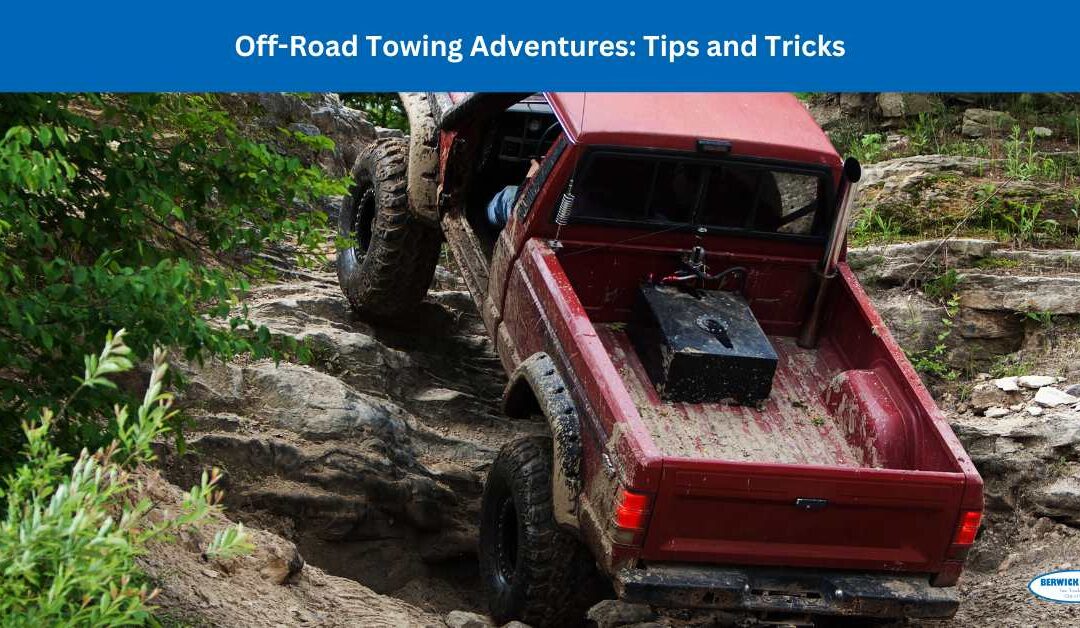Off-road towing is exhilarating, blending adventure with practical problem-solving. Whether you’re towing an ATV, dirt bike, or recovery vehicle through rugged terrain, the journey offers unique challenges. Here are key tips and tricks to make sure your off-road towing adventures are safe and successful.
1. Choose the Right Towing Vehicle and Equipment
Selecting a capable towing vehicle is paramount for off-road adventures. Look for a vehicle with a robust engine, high towing capacity, and strong suspension. Trucks, SUVs, or 4x4s equipped with all-terrain tires and a lift kit are great choices for rough terrains. When choosing a trailer, opt for one specifically designed for off-road use; it should have high ground clearance, durable axles, and reinforced suspension.
Additionally, equip your vehicle with an off-road towing hitch, D-ring shackles, and heavy-duty recovery straps to help navigate tough terrains and ensure stability.
2. Secure the Load Properly
Off-road conditions can jostle your cargo much more than paved roads, so securing it effectively is crucial. Use heavy-duty tie-down straps with high load ratings and reinforce them at multiple points. Check that the load is evenly distributed and tightly secured to minimize sway and improve traction.
3. Inspect Tires and Suspension
Since off-roading involves unpredictable terrains, make sure your tires are up to the task. Off-road or mud-terrain tires with good tread are essential for navigating challenging landscapes. Additionally, ensure the trailer’s tires are also suitable for off-road conditions. Examine your vehicle’s and trailer’s suspension systems for durability and strength, as they bear the brunt of rough terrain impact.
4. Monitor Weight and Balance
Weight and balance are key in any towing situation, but they are particularly critical off-road. Avoid overloading the trailer or your vehicle to ensure they maintain proper handling. Aim for a 60/40 distribution, with about 60% of the load toward the front of the trailer to avoid excessive sway. An imbalanced load can make off-road towing harder to control, especially on steep inclines or rocky paths.
5. Plan Your Route and Research the Terrain
Off-road towing is unpredictable, but a bit of pre-planning can save you from unnecessary risks. Research the terrain of the area you’re heading into and look for potential obstacles, such as rivers, steep inclines, and rough paths. Using a GPS map specifically designed for off-roading can help you navigate more efficiently. Be mindful of weather conditions as well, as mud, rain, or snow can make the terrain significantly more challenging.
6. Keep Speeds Low and Maintain Control
Navigating uneven or slippery terrain requires extra caution, so keep your speeds low and be deliberate with your steering. Off-road towing requires precision, not speed. By moving slowly, you reduce the chances of tipping over, skidding, or damaging your vehicle or cargo. Engage low-range gearing to provide better control over rocky paths, and avoid sudden braking or accelerating.
7. Use Proper Braking Techniques
Towing off-road often means dealing with steep inclines and declines. When descending, avoid riding the brakes constantly as this can lead to brake overheating and loss of control. Instead, downshift to a lower gear to use engine braking, which provides a more controlled descent. For braking on rough terrain, apply the brakes in short bursts to maintain stability.
8. Equip Your Vehicle with Recovery Gear
Carry essential recovery gear, including a winch, a high-lift jack, and traction mats. A winch is invaluable for pulling your vehicle or trailer out of mud or over obstacles. High-lift jacks are useful for raising vehicles in rough terrains for repairs or repositioning. Traction mats can provide grip on soft surfaces, like mud or sand, preventing the tires from spinning in place.
9. Check Your Towing Connections Regularly
On off-road paths, vibrations and jolts are inevitable. Frequent stops to check your towing connections, hitch, and straps are essential to ensure nothing has come loose. This simple step can prevent accidents and ensure that your load stays secure throughout the journey.
10. Prepare for the Unexpected
Off-roading is unpredictable, so prepare for possible scenarios. Bring extra fuel, water, a first-aid kit, and a fully charged satellite phone in case you lose cell reception. Packing tools for minor repairs and a portable air compressor to adjust tire pressure can also be lifesavers on remote trails.
11. Practice in Advance
If you’re new to off-road towing, consider practicing on a controlled course or easier terrain before heading out. Getting a feel for handling, braking, and maneuvering with a trailer in a safe environment will give you more confidence and control when you venture into wilder areas.
Wrapping Up
With the right equipment, preparation, and caution, off-road towing can turn into an adventure rather than a challenge. By following these tips, you can confidently tackle off-road trails, enjoy nature’s beauty, and return with stories of a journey well-towed.
If you are in Berwick, Victoria 3806, Australia, and looking for a car removal service, this is the best way to visit us.
Contact Us
Berwick Towing & Transport
27B William Rd
Berwick VIC 3806
(03) 7035 7815
www..berwick-towing.com.au/\

